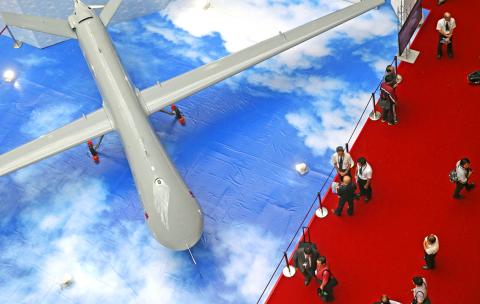Aerospace Industrial Development Corp (AIDC, 漢翔航空工業), the nation’s largest civilian and military aircraft manufacturer, yesterday demonstrated two new prototype trainer jets at a Taipei aerospace trade fair in a move to show its resolve in vying for the Republic of China Air Force’s NT$69 billion (US$2.1 billion) project to upgrade its aging fleet of 66 trainer aircraft.
The two new advanced trainer jets — the XAT-5, a stripped-down variant of the F-CK1, and the AT-3MAX, an upgraded variant of the aging AT-3 featuring revamped radar systems and an improved engine — were on display at the biennial Taipei Aerospace and Defense Technology Exhibition, which began yesterday.
In response to rumors that the armed forces might be favoring the Italian-built M-346 trainer, AIDC chairman Anson Liao (廖榮鑫) said President Ma Ying-jeou (馬英九) had pledged that even if the procurement deal fell to a foreign bidder, the aircraft would still be built in Taiwan.

Photo: AP
AIDC is also facing competition from the South Korean-built T-50.
“Given AIDC’s track record of building and designing the indigenously developed F-CK1s and AT-3 trainer jets, the company is the ideal choice to build the nation’s next generation of trainer aircraft,” said Liao, a former air force pilot.
The deal is crucial for AIDC, as it is expected to yield revenue of NT$200 billion for parts and maintenance over their service life spanning the next two decades, Liao said.
However, with delivery of the jets to begin in 2019, the armed forces has not indicated a clear timetable for AIDC, Liao said.
“Uncertainties remains in the Ministry of National Defense’s final decision on combat specifications and budget, but AIDC is fully capable of overcoming all technical challenges,” he said.
AIDC is pushing for at least 50 percent domestic production for the next-generation aircraft, although it is difficult to gauge what the air force’s decision will be regarding the training aircraft, Liao said.
“If the goal is to train our pilots for the Lockheed Martin F-35, a certain type of trainer jet would be required, while other fighters require different training aircraft,” he said.
Seperately, Yuanta Securities Investment Consulting Co (元大投顧) said AIDC would not be affected by Lockheed Martin’s acquisition of Sikorsky, a major client of the Taiwanese firm with a 6 percent revenue contribution last year.
“In addition, the company has broken into the supply chain for the China-built C919, making company immune to competition between the Airbus A320 and the Boeing B737 short-to-medium range narrow-body airliner,” Yuanta analyst Livia Wu (吳靚芙) said in a report on Wednesday, adding that she is positive over AIDC’s commercial aircraft and general aviation businesses.
Last quarter, AIDC recorded net income of NT$444.6 million, or NT$0.49 per share, on sales of NT$6.9 billion. Net income in the first half came to NT$868 million, or NT$0.95 per share, on sales of NT$12.8 billion.
AIDC shares gained 0.27 percent to close at NT$37.65 in Taipei trading yesterday.

‘SWASTICAR’: Tesla CEO Elon Musk’s close association with Donald Trump has prompted opponents to brand him a ‘Nazi’ and resulted in a dramatic drop in sales Demonstrators descended on Tesla Inc dealerships across the US, and in Europe and Canada on Saturday to protest company chief Elon Musk, who has amassed extraordinary power as a top adviser to US President Donald Trump. Waving signs with messages such as “Musk is stealing our money” and “Reclaim our country,” the protests largely took place peacefully following fiery episodes of vandalism on Tesla vehicles, dealerships and other facilities in recent weeks that US officials have denounced as terrorism. Hundreds rallied on Saturday outside the Tesla dealership in Manhattan. Some blasted Musk, the world’s richest man, while others demanded the shuttering of his

ADVERSARIES: The new list includes 11 entities in China and one in Taiwan, which is a local branch of Chinese cloud computing firm Inspur Group The US added dozens of entities to a trade blacklist on Tuesday, the US Department of Commerce said, in part to disrupt Beijing’s artificial intelligence (AI) and advanced computing capabilities. The action affects 80 entities from countries including China, the United Arab Emirates and Iran, with the commerce department citing their “activities contrary to US national security and foreign policy.” Those added to the “entity list” are restricted from obtaining US items and technologies without government authorization. “We will not allow adversaries to exploit American technology to bolster their own militaries and threaten American lives,” US Secretary of Commerce Howard Lutnick said. The entities

Minister of Finance Chuang Tsui-yun (莊翠雲) yesterday told lawmakers that she “would not speculate,” but a “response plan” has been prepared in case Taiwan is targeted by US President Donald Trump’s reciprocal tariffs, which are to be announced on Wednesday next week. The Trump administration, including US Secretary of the Treasury Scott Bessent, has said that much of the proposed reciprocal tariffs would focus on the 15 countries that have the highest trade surpluses with the US. Bessent has referred to those countries as the “dirty 15,” but has not named them. Last year, Taiwan’s US$73.9 billion trade surplus with the US

Prices of gasoline and diesel products at domestic gas stations are to fall NT$0.2 and NT$0.1 per liter respectively this week, even though international crude oil prices rose last week, CPC Corp, Taiwan (台灣中油) and Formosa Petrochemical Corp (台塑石化) said yesterday. International crude oil prices continued rising last week, as the US Energy Information Administration reported a larger-than-expected drop in US commercial crude oil inventories, CPC said in a statement. Based on the company’s floating oil price formula, the cost of crude oil rose 2.38 percent last week from a week earlier, it said. News that US President Donald Trump plans a “secondary